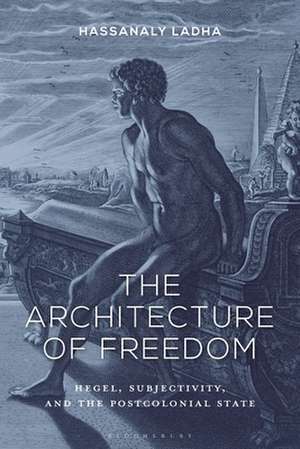The Architecture of Freedom: Hegel, Subjectivity, and the Postcolonial State
Autor Hassanaly Ladhaen Limba Engleză Paperback – 16 iun 2021
| Toate formatele și edițiile | Preț | Express |
|---|---|---|
| Paperback (1) | 220.22 lei 6-8 săpt. | |
| Bloomsbury Publishing – 16 iun 2021 | 220.22 lei 6-8 săpt. | |
| Hardback (1) | 659.02 lei 6-8 săpt. | |
| Bloomsbury Publishing – 25 dec 2019 | 659.02 lei 6-8 săpt. |
Preț: 220.22 lei
Preț vechi: 276.21 lei
-20% Nou
Puncte Express: 330
Preț estimativ în valută:
42.14€ • 43.73$ • 35.23£
42.14€ • 43.73$ • 35.23£
Carte tipărită la comandă
Livrare economică 15-29 martie
Preluare comenzi: 021 569.72.76
Specificații
ISBN-13: 9781350267435
ISBN-10: 1350267430
Pagini: 320
Ilustrații: 8 colour illus
Dimensiuni: 156 x 234 mm
Greutate: 0.47 kg
Editura: Bloomsbury Publishing
Colecția Bloomsbury Academic
Locul publicării:London, United Kingdom
ISBN-10: 1350267430
Pagini: 320
Ilustrații: 8 colour illus
Dimensiuni: 156 x 234 mm
Greutate: 0.47 kg
Editura: Bloomsbury Publishing
Colecția Bloomsbury Academic
Locul publicării:London, United Kingdom
Caracteristici
Opens new spaces for postcolonial studies and African studies by encouraging us to look to contemporary Africa to reinterpret Hegel's thought
Notă biografică
Hassanaly Ladha is Associate Professor in Literatures, Cultures, and Languages at the University of Connecticut, USA.
Cuprins
IntroductionPart One Hegel's MemnonChapter 1. The Figure of HistoryChapter 2. Naming BuildingChapter 3. From Memnon to MnemosyneChapter 4. Architecture and the Poetry of LightChapter 5. The Architectonic in TimePart Two Africa and the Idea of FreedomChapter 6. The Structure of The Phenomenology of SpiritChapter 7. The World Turned Upside-DownChapter 8. Slavery and the SubjectChapter 9. Africa, Agency, and FreedomChapter 10. The Postcolonial StateConclusion: Aesthetics and SovereigntyBibliography Index
Recenzii
Ladha brilliantly demonstrates that the central role of aesthetics in Hegel's political philosophy extends to his concepts of freedom and subjectivity, allowing for a new reading of the master-slave dialectic and of 'Africa' itself. The book offers crucial new developments that should radically influence all debates on slavery and Africa at the time of the Enlightenment, as well as post-colonial investigations.
Ladha's richly-detailed and wide-ranging book offers an important new perspective on Hegel, exploring with a fresh eye the relevance of his philosophy for current discussions of race, art, language, history, and politics.
Ladha pursues Hegel's architectonic from aesthetic trace to international border, positing the centrality of slavery to his philosophy and reframing him as an exemplary thinker for the postcolonial present and future.
Ladha's magisterial Architecture works its brilliant way through the entire Hegelian corpus, providing our first full analysis of the architectonic through-line of dialectical thought. Retracing the aesthetic origin of freedom from the hieroglyph-laden pyramid to the 'hieroglyph of reason' always imperfectly realized in the 'architectonic' 'artwork' of the particular 'state,' Architecture is a magnificent, pathbreaking work.
Ladha's richly-detailed and wide-ranging book offers an important new perspective on Hegel, exploring with a fresh eye the relevance of his philosophy for current discussions of race, art, language, history, and politics.
Ladha pursues Hegel's architectonic from aesthetic trace to international border, positing the centrality of slavery to his philosophy and reframing him as an exemplary thinker for the postcolonial present and future.
Ladha's magisterial Architecture works its brilliant way through the entire Hegelian corpus, providing our first full analysis of the architectonic through-line of dialectical thought. Retracing the aesthetic origin of freedom from the hieroglyph-laden pyramid to the 'hieroglyph of reason' always imperfectly realized in the 'architectonic' 'artwork' of the particular 'state,' Architecture is a magnificent, pathbreaking work.
